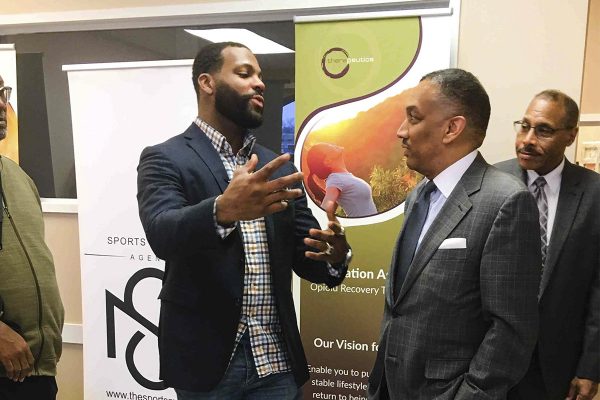
Braylon Edwards, left, is is currently promoting his new book. He is open about his struggles with substance abuse. Kristy King | Washtenaw Voice
By Kristy King
Staff Writer
After the end of his career in the NFL, Braylon Edwards fell into bouts of depression and struggled with addiction. Now, Braylon spends his time shedding light on substance use disorder and recovery, asking people to come out of the shadows.
The former University of Michigan wide receiver was in Ann Arbor, partnering with the NFL alumni association and The Sports Marketing Agency to raise awareness on substance use disorder. He was available for photographs, conversations and autographs while promoting his new book, “Braylon Edwards: Doing It My Way: My Outspoken Life as a Michigan Wolverine, NFL Receiver, and Beyond.”
“The NFL alumni worked with SMA on an event with Sean Jordan in ‘17 or ‘18 in Monroe, Michigan,” Edwards said. “I was a paid representative from the NFL Alumni Association that spoke on opioid use and I liked what I saw. There were a bunch of former NFL players there along with Sean Jordan who has so much passion, which was something I wanted to be around.”
Mental illness is defined as any mental, behavioral or emotional disorder; mental illness affects one in five of U.S. adults, according to the National Institute of Mental Health. The average adult waits 11 years before they seek help for a disorder, and one in 12 adults have a diagnosable substance use disorder according to the American Psychiatric Association.
Edwards said that he began dealing with substance use disorder in 2012.
“2013 was the first year I didn’t play and found myself doing it more and more,” Edwards said. “It wasn’t for any other reason than to cope.”
The Wolverine talked about how trauma and addiction go hand and hand. For athletes, they typically start abusing a substance because they’ve been hurt. They may eventually get cut from the sport because they’re relying on the substance more and more.
According to Recovery.org, 52-71% of professional football players have used opioids.
Braylon discussed the similarities between athletes and everyday Americans; when something traumatic happens, it can lead someone to cope in an unhealthy manner and become entangled in a substance use disorder.
Braylon encourages any individual in the “spotlight” to be brave and speak out about their struggles because that gives other people the courage to come forward. It lets them know that they’re not alone. Edwards went on giving high regards to his family and friends who were his support system.


